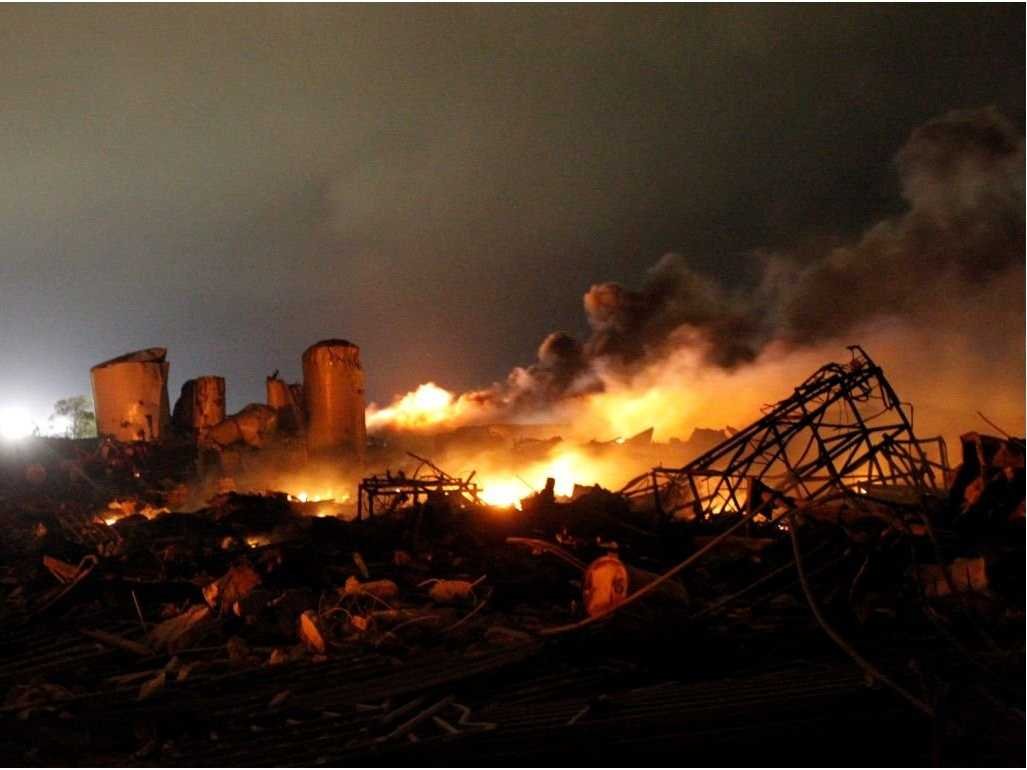
Up to 15 people are thought to have been killed by the huge explosion at West fertilizer plant near Waco, Texas.
More than 160 people were injured as dozens of homes and buildings were destroyed in the evening blast that witnesses said was “like a tornado”.
Emergency services are still going from home to home trying to find survivors.
A number of firefighters were tackling a blaze at the scene when the explosion happened, and are still missing.
The explosion happened at West Fertilizer on the edge of West, a town of about 2,700 people some 20 miles north of Waco.
Sgt. William Swanton of the Waco police department said he could not give an accurate figure of the number of people killed in the explosion – but estimated between five and 15.
But with a search still going on, other officials suggested the final toll could be significantly higher.

Sgt. William Swanton said at least 160 people had been treated at various hospitals.
He said the blast site was being treated as a crime scene – but this was procedural and he had “no indications this was anything other than an accidental fire”.
Emergency services officials said ammonia may have caused the explosion.
It has been reported the company had 54,000 lbs (20 tonnes) of anhydrous ammonia on site.
Police earlier said the half the town had been evacuated, amid fears of possible further explosions or a leak of toxic gas – though at his press conference just before 06:00 local time, Sgt. William Swanton said he did not believe there was a threat from air quality.
The West Fertilizer plant is right on the edge of town, only a few hundred metres from houses, a school and nursing home.
Several witnesses describe rushing to the nursing home to help residents, only to find it flattened – though it appears many people had already been evacuated because the fire was recognized as an explosion risk.
TV images showed streams of emergency vehicles descending on the site and ambulance crews using a nearby sports field as an emergency treatment area. The injured were being carried to hospital not just in ambulances but in police squad cars and helicopters.
Glenn A. Robinson, chief executive of Hillcrest Baptist Medical Center in Waco, told CNN the hospital was seeing “everything from orthopaedic injuries to patients that are experiencing serious blood loss”.
McLennan County Sheriff Parnell McNamara said: “It’s a lot of devastation. I’ve never seen anything like this. It looks like a war zone with all the debris.”
Witness Debby Marak told the Associated Press news agency that she had seen smoke coming from the area near the plant and had driven over to see what was happening.
She said that when she arrived, two boys ran towards her screaming that the authorities had told them to leave because the fertilizer plant was going to explode.
Debby Marak said she drove a short distance before the blast happened.
“It was like being in a tornado,” she said.
“Stuff was flying everywhere. It blew out my windshield. It was like the whole earth shook.”
Another resident told KWTX-TV that she heard several explosions from 13 miles away.
The Dallas Morning News reported that West Fertilizer had told the Environmental Protection Agency that it presented no risk of fire or explosion.
The newspaper said it had seen documents in which the plant said it stored large amounts of anhydrous ammonia, but the worst scenario envisaged was a release of ammonia gas that would harm no-one.
The explosion came almost on the anniversary of another ammonia explosion disaster in Texas.
On April 16, 1947, a fire on a ship loaded with ammonium nitrate set off a series of explosions in the port of Texas City, and fires that burned for days. More than 500 people were killed and more than 1,000 buildings damaged in what remains the deadliest industrial accident in US history.
What is anhydrous ammonia?
- Commonly used as fertilizer, injected into the soil
- Must be stored in high pressure tanks
- Produces poisonous vapor cloud on exposure to water
- Forms explosive mixture when combined with air
- Can cause severe burns to skin in concentrated form
Source: US Centers for Disease Control and Prevention (CDC)
[youtube I9NSVJ6RG4I]
[youtube CNCxleQQ46s]